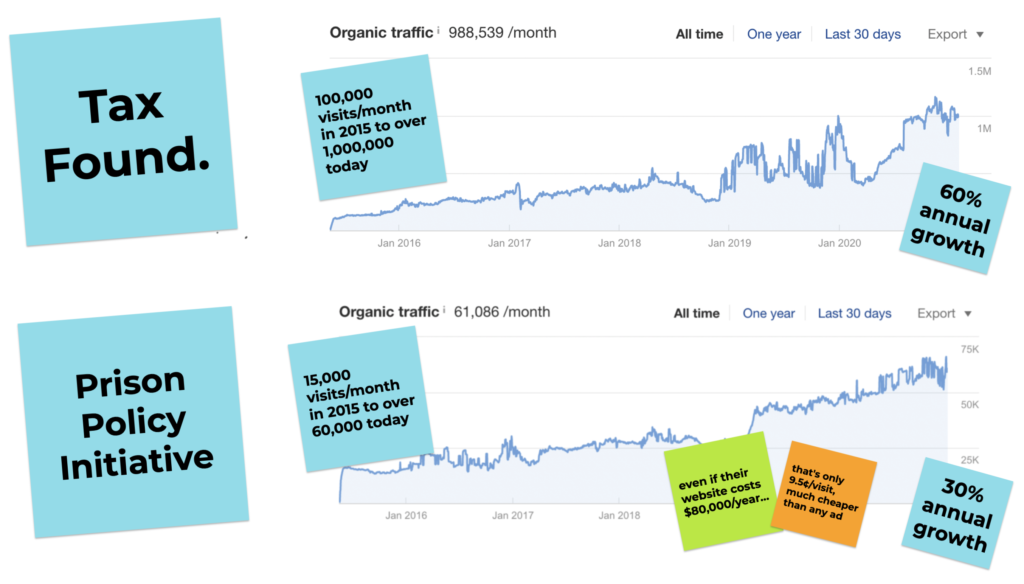Eligibility
In the US, the requirements are strict, but simple. According to Google’s eligibility guidelines an organization must:
- Be recognized by the IRS as tax-exempt 501(c)(3) organization
- Fiscally sponsored organizations are not eligible for Google for Nonprofits.
- Organizations, such as churches, that are automatically considered tax-exempt under group exemption must still obtain recognition of 501(c)(3) tax exemption from the IRS to qualify for the Google for Nonprofits program.
- Organizations must be validated by TechSoup.
TechSoup partners with companies like Google to verify the nonprofit status of organizations. You’ll verify your nonprofit status with TechSoup, then they’ll issue you a token (a long string of letters and numbers similar to a password) and then you’ll copy and paste that token to your Google for Nonprofits account. For more info, see Get Verified by TechSoup in the Google for Nonprofits Help Center.
Compliance
Google provides comprehensive compliance guidelines in the Ad Grants Help Center. Those guidelines are posted along with step-by-step instructions for how to put those guidelines into action. Here’s a brief overview of the guidelines themselves:
- No single-word keywords permitted
- No overly generic keywords permitted
- No keywords with a quality score of 1 or 2 permitted
- Maintain a 5% click-through rate (CTR) each month
- Must have valid conversion tracking
Account Structure Guidelines
Google also mandates that your account maintain a certain structure. These aren’t onerous regulation, but instead are good best practices that any account should employ anyway.
- Must have at least 2 ads per ad group
- Must have at least 2 ad groups per campaign
- Must have at least 2 sitelink ad extensions
- Must respond to program survey
Strategy
Your Google Ad Grant is $10,000 a month. That may seem like a lot, but you can burn through it surprisingly quickly. To make the most of your grant, it’s crucial to have a coherent strategy in place.
To start, you need to be focused on the right goals. Because PPC (pay per click) rates through Google Ads are often between $1.50 and $4.00 per click, your $10,000 a month grant may only generate between 1,000 and 2,500 clicks per month. That means Ad Grants won’t drive massive volumes of traffic to your site—that’s more of a job for search engine optimization or (SEO). Instead, your Ad Grants account should be focused on driving high-value traffic to your site. That means:
- Donations
- List-Building
- Volunteers, Internships, Fellowships, Scholarships
By focusing on these areas, you’ll be able to convert your $10,000/month grant into a long-term value that will build over time.
Keywords
To achieve any of the goals above, you’ll need to target the right keywords. To get started with keyword research, I recommend the following guides:
- How to Do Keyword Research by Tim Soulo at Ahrefs
- KEYWORD RESEARCH: The Definitive Guide (2021) by Brian Dean at Backlinko
- Keyword Research Course with Greg Gifford at SEMRush Academy
To make things incredibly simple, keywords research involves finding the right balance of three factors:
- Volume: You want to find terms that are in high enough volume for your ads to actually be displayed.
- Competition: You want to find terms that aren’t already being bid on so your ads have a chance to show up on the first page of results.
- Relevancy: Your keywords must be relevant to the content you’re promoting. Don’t be tempted to chase after high-volume keywords if they don’t match your content well. Doing so will hurt your ad quality score and your account’s overall health with suffer for it.
Going Beyond Ad Grants and PPC
As I said above, $10,000 is a lot of money, but it goes quickly. To cast a wider net in search and capture less focused traffic at a far greater volume, you’ll need to incorporate SEO (search engine optimization) into your overall SEM (search engine marketing) strategy.
To again oversimplify a complex topic, search engine optimization relies on three basic factors:
- Content: The stuff you produce needs to be high-quality and serve the customer’s need.
- Authority: You need to be an authority on the topic. You can demonstrate this through links and EAT.
- Performance: Your website needs to be fast and hit other performance metrics. Those are most easily identified through using Google Search Console and automated technical audits like the Ahrefs audit tool.
Groups that have focused on creating high-value content, building authority through accruing links (good content tends to attract links anyway), and have built simple high-performing sites have been able to grow their organic (unpaid) search traffic by 30% or 60% per year.

Shoulder Content
One strategy for building high-quality content that really generates search traffic is creating “shoulder content,” or content that is related to the primary work you do, but not an analysis, study, or other typical think tank work.
Where we see the most success is with should content that answer really basic questions about a public policy issue.
The Tax Foundation does this with its 2020 Tax Brackets page, which alone generates over 100,000 pageviews a month. This page offers only basic facts—no analysis, no history of the tax policy, no pros and cons of various approaches to reform. Instead of directly pushing for policy change on this page, The Tax Foundation employs it to generate traffic, building their brand as a tax policy authority.
These tax bracket pages also accumulate a huge number of links (2,800 links from 736 unique domains), raising the overall authority of their site and raising the page authority of any pages linked from this page. This means that more specific queries like “joe biden tax plan” are also ranked #1 on Google.
We Can Help
Want to improve your web marketing game? Call us for a free 20-minute consultation. We can help you identify the problems you should address to create the biggest return on investment.
Don’t worry, this phone call won’t be “salesy.” Our call will be focused on learning about your goals and the problems you’re facing. That way, we can determine if our approach would be a good fit for your needs.
Book a free 20-minute consultation